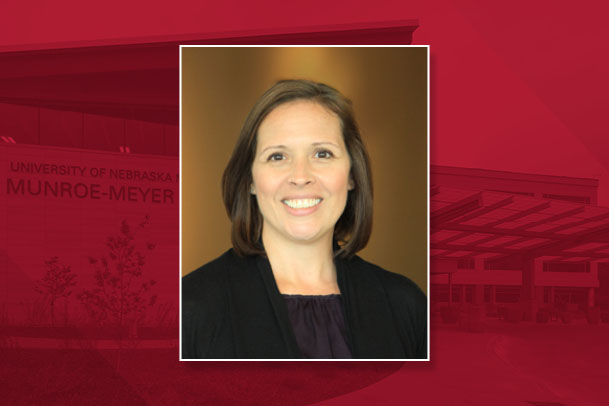Alice Shillingsburg, PhD, is the UNMC Munroe-Meyer Institute’s new director of the integrated Center for Autism Spectrum Disorders (iCASD).
MMI Monthly spoke with Dr. Shillingsburg to learn more about her background, her goals and what drove her to commit to her leadership position at MMI.
How did you decide to devote your career to autism and autism research?
When I think back, it’s difficult to isolate any one particular reason or experience that led me to focus my career on autism. With each child and family I have worked with, I have experienced really rewarding clinical outcomes. When you get to help people in such meaningful ways, it’s an easy profession to love. One of the things I love best is working to bridge the research-to-practice gap. As both a clinical educator and a clinical researcher, I get to spend my time teaching and supervising the next generation of providers while also disseminating new research findings at conferences and in publications. But bridging the research to practice gap actually is bi-directional. Working with and listening to people on the spectrum and their families has made me a better clinician and researcher.
What made you decide to come to the Munroe-Meyer Institute and the integrated Center for Autism Spectrum Disorders?
MMI has a tremendous reputation. It’s nationally recognized for its services to individuals with intellectual and developmental disabilities. When I visited and got to see MMI and iCASD firsthand, I knew it was the right place for me. The support for clinical services, training and research is obvious in so many ways. The faculty are leaders in the field. The applied behavior analysis (ABA) doctoral program is well regarded as a top training program. Training spots in the psychology internship and postdoctoral fellowship program are highly sought after. All of this comes together under one roof in a building that was so carefully designed to meet the needs of the people being served and in a community that clearly supports the mission. I was sold.
How well is MMI positioned to address the many issues surrounding autism?
Autism is complex. There is a huge range in terms of how a person with autism is affected, with some people needing a tremendous amount of support in numerous areas across the lifespan, whereas others may need little support or support only for certain concerns or a limited amount of time. Sometimes, autism doesn’t just affect the person diagnosed with it, and it isn’t just about the primary features of social communication and restricted behaviors and interests. For many families, support is needed for the whole family. In many cases, the severity of the disorder impacts access to medical care, which affects health and well-being beyond autism. It is rare to find clinical settings that can provide multiple types of services. MMI is one those places that does offer a range of services. In addition to ABA-based interventions to promote social communication and other functional, adaptive skills, MMI also has specialty services in feeding disorders, severe behaviors, speech services and others. MMI has onsite dental and vision care and provides amazing resources such as recreational therapy and care coordination. All of this, with room to grow.
What do you see as your greatest challenge in addressing autism issues as the new director of the iCASD?
The greatest challenge is access to care — both assessment and treatment services. ABA-based services are affected by the same staffing issues that are facing almost every profession in this country right now, but they also are affected by staffing shortages that are specific to the discipline. There just aren’t enough registered behavior technicians (RBTs) and board-certified behavior analysts (BCBA) to serve all the children with autism who need ABA. There also aren’t enough licensed psychologists with specialized training in autism diagnostics. This seems especially true in Nebraska. So, my biggest challenge is to understand reasons for this and propose creative solutions. We know that autism can be diagnosed as early as 18 months of age, and we know that early intensive behavioral intervention is best to promote outcomes. We need to attract providers and retain them here.
How is MMI working to reach families navigating a diagnosis or maybe having their care set back from the pandemic?
The pandemic was a major setback for families with concerns about their child’s development. The closure of daycares, schools and other in-person services likely resulted in many toddlers showing early signs of concern to go undetected. Delays in early detection leads to delays in follow-up assessment. The Autism Diagnostic Clinic at MMI has been hard at work trying to get children in for diagnostic appointments and recently added a new psychologist to the team. We’re actively recruiting additional psychologists to add additional diagnostic slots, as well as to offer behavioral caregiver training for newly diagnosed families. I’m hoping we’ll continue to grow our team to meet more needs in the community.
What message do you want to send to the MMI community?
We’re hiring! Tell your friends!
Just kidding. I’d just like to say thanks for the opportunity to serve in this role. I’m excited to see how things grow in the coming years and happy to be a part of the team.
